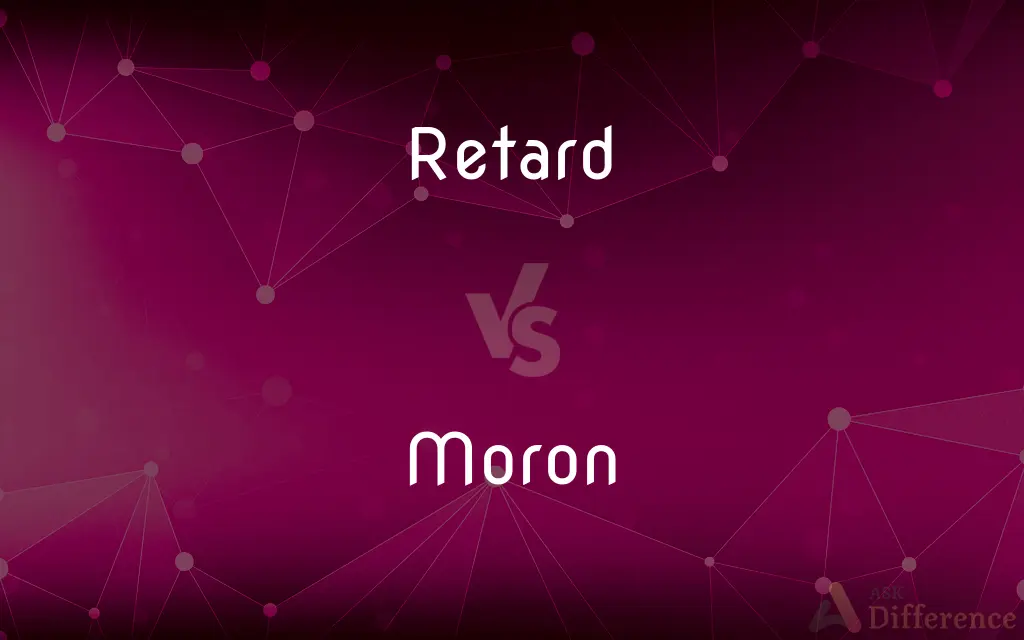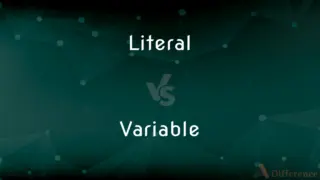Retard vs. Moron — What's the Difference?
By Fiza Rafique & Urooj Arif — Updated on May 7, 2024
"Retard" is an outdated and offensive term historically used to describe intellectual disability, while "moron" was once a clinical category for mild intellectual disability but is now a derogatory term.

Difference Between Retard and Moron
Table of Contents
ADVERTISEMENT
Key Differences
The term "retard" originated as a medical term but has evolved into a pejorative slang that is widely considered insensitive and offensive, used to demean individuals with disabilities. In contrast, "moron" was introduced in the early 20th century by psychologists to categorize individuals with mild intellectual disabilities, but it too has shifted into common vernacular as an insult.
Both terms have been removed from professional use in psychology and healthcare due to their derogatory connotations and the negative impact they can have on individuals. Instead, terms like "intellectual disability" or "cognitive impairment" are preferred, reflecting a more respectful and accurate approach to describing individuals with such conditions.
While "retard" has been rejected in almost all forms of public discourse and is considered highly offensive, "moron" remains in casual use, albeit as an insult rather than a clinical descriptor. This usage still carries a negative stigma and can be hurtful when directed at individuals.
Historically, both terms were part of a lexicon that classified people by intelligence levels in a way that is now deemed unethical and scientifically baseless. The evolution of language and understanding around intellectual disabilities has led to a more sensitive approach in terminology.
The social implications of using either "retard" or "moron" are significant, as they perpetuate stereotypes and exclusion of people with intellectual disabilities. Awareness and education about the impact of these words are key in reducing their usage and promoting inclusivity.
ADVERTISEMENT
Comparison Chart
Original Use
Medical term for delay
Clinical term for mild disability
Current Use
Offensive, not used
Insult, sometimes used casually
Social Acceptability
Highly unacceptable
Unacceptable but less severe
Impact on Disabilities Community
Extremely negative
Negative
Preferred Modern Terminology
Intellectual or cognitive disability
Intellectual or cognitive disability
Compare with Definitions
Retard
Associated with social stigma.
The stigma attached to retard has rightfully made it unacceptable.
Moron
Carries a connotation of low intelligence.
The term moron is often used to criticize someone's mistake or foolishness.
Retard
Now considered an offensive and derogatory term.
He realized that using retard was hurtful and stopped.
Moron
Less offensive than "retard" but still derogatory.
Calling someone a moron can be seen as rude and insensitive.
Retard
Historically used to describe developmental delays.
The term retard is outdated and should not be used.
Moron
Occasionally appears in casual speech.
The word moron pops up in casual conversations more than it should.
Retard
Used as an insult to demean others.
Using retard as an insult reflects poorly on one's character.
Moron
Originally a psychological classification.
Moron was once a term used in psychological assessments.
Retard
Avoided in professional and respectful discourse.
In professional settings, terms like cognitive disability replace retard.
Moron
Now used as a general insult.
He offhandedly called his friend a moron for forgetting the tickets.
Retard
To cause to move or proceed slowly; delay or impede.
Moron
A person who is considered foolish or stupid.
Retard
To be delayed.
Moron
A person with mild intellectual disability having a mental age of from 7 to 12 years and generally having communication and social skills enabling some degree of academic or vocational education. The term belongs to a classification system no longer in use and is now considered offensive.
Retard
A slowing down or hindering of progress; a delay.
Moron
A stupid person; an idiot; a fool.
Retard
(Music) A slackening of tempo.
Moron
A person of mild mental subnormality in the former classification of mental retardation, having an intelligence quotient of 50–70.
Retard
Used as a disparaging term for a person with an intellectual disability.
Moron
A mentally retarded person whose intellectual development proceeds normally up to about the eighth year of age and is then arrested so that there is little or no further development; an adult having the mental development of an 8-to-12-year old. A moron is considered capable of doing routine work under supervision.
Retard
A person considered to be foolish or socially inept.
Moron
Hence, a very stupid person.
Retard
Retardation; delay.
Moron
An inferior olive size having a woody pulp and a large clingstone pit, growing in the mountainous and high-valley districts around the city of Moron, in Spain.
Retard
(music) A slowing down of the tempo; a ritardando.
Moron
A person of subnormal intelligence
Retard
A person with mental retardation.
The retard in our class needs special help.
Retard
A person or being who is extremely stupid or slow to learn.
Retard
(transitive) To keep delaying; to continue to hinder; to prevent from progressing.
Retard the march of an army
Retard the motion of a ship
Retard
(transitive) To put off; to postpone.
To retard the attacks of old age
To retard a rupture between nations
Retard
To be slow or dilatory to perform (something).
Retard
(intransitive) To decelerate; to slow down.
Retard
To stay back.
Retard
To keep delaying; to continue to hinder; to prevent from progress; to render more slow in progress; to impede; to hinder; as, to retard the march of an army; to retard the motion of a ship; - opposed to accelerate.
Retard
To put off; to postpone; as, to retard the attacks of old age; to retard a rupture between nations.
Retard
To stay back.
Retard
Retardation; delay.
Retard
A mentally retarded person.
Retard
A person who is stupid or inept, especially in social situations.
Retard
A person of subnormal intelligence
Retard
Slow the growth or development of;
The brain damage will retard the child's language development
Retard
Cause to move more slowly or operate at a slower rate;
This drug will retard your heart rate
Retard
Be delayed
Retard
Lose velocity; move more slowly;
The car decelerated
Common Curiosities
Is it acceptable to use "moron" in everyday language?
While less severe than "retard", it's still considered rude and should be avoided.
Can "moron" still be used in medical contexts?
No, it has been phased out in favor of more accurate and respectful terms.
How should one refer to someone with intellectual disabilities?
Use "person with an intellectual disability" or similar person-first language.
Why are terms like "retard" and "moron" harmful?
They reinforce outdated stereotypes and can lead to social exclusion.
What is the origin of the term "retard"?
It originated as a medical term for developmental delay.
What is the difference in severity between "retard" and "moron"?
"Retard" is highly offensive, whereas "moron" is somewhat less charged but still derogatory.
Why is "retard" considered offensive?
It's used derogatorily and perpetuates negative stereotypes.
What has replaced these terms in professional settings?
Terms like "intellectual disability" or "cognitive impairment" are used.
How has public perception of these terms changed over time?
Awareness and sensitivity regarding disabilities have made such terms unacceptable.
How can one correct someone using these terms inappropriately?
Gently inform them about the offensive nature of the words and suggest alternative language.
What are alternatives to using terms like "retard" and "moron"?
Using precise and respectful language that describes conditions or behaviors without stigmatizing.
What can be done to discourage the use of these terms?
Education and promoting awareness about the impact of language on stigmatization.
What are the consequences of using these terms in social settings?
They can contribute to an environment of intolerance and discrimination.
Is there a legal context where these terms are still relevant?
No, they have been removed from legal and medical terminology due to their offensive nature.
How do these terms impact the dignity of individuals?
They devalue and disrespect the individuality and humanity of people with disabilities.
Share Your Discovery

Previous Comparison
Grateful vs. Graceful
Next Comparison
Literal vs. VariableAuthor Spotlight
Written by
Fiza RafiqueFiza Rafique is a skilled content writer at AskDifference.com, where she meticulously refines and enhances written pieces. Drawing from her vast editorial expertise, Fiza ensures clarity, accuracy, and precision in every article. Passionate about language, she continually seeks to elevate the quality of content for readers worldwide.
Co-written by
Urooj ArifUrooj is a skilled content writer at Ask Difference, known for her exceptional ability to simplify complex topics into engaging and informative content. With a passion for research and a flair for clear, concise writing, she consistently delivers articles that resonate with our diverse audience.













































